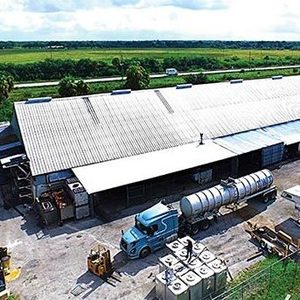Biodiesel Opportunities Abroad

PHOTO: GENUINE BIO-FUEL INC.
January 12, 2016
BY Ron Kotrba
A handful of U.S. biodiesel producers are developing projects overseas, whether it’s to capitalize on emerging or growing international markets or to take refuge from the business-stifling inconsistency of U.S. policy. “In the near future, our goal is to locate a production facility in Mexico, in one of the border states,” says Todd Hill, founder of the now-defunct Promethean Biofuels biodiesel plant, formerly located in Temecula, California.
Promethean’s decline is a complicated story. It was in the midst of expanding when it was hit by a perfect storm, Hill says. “The year prior, we had been negatively impacted by the bankruptcy of one of our customers, which left us with some operating and payroll issues,” he says. “We were profitable, so that issue would have worked itself out over time. The No. 1 issue was that being colocated next to another recycler we had twice the regulatory burden. Some of the facility changes required would have impacted our landlord adversely and as such, instead of making the changes, we lost our lease. It originally took two years to permit Promethean’s facility, and we did not have cash reserves sufficient to relocate and permit a new facility. We briefly attempted to partner with a local tribal organization, but that ultimately did not pan out.”
Hill recently founded a new firm, Spaq Omni Acquisition Co., that he says is first and foremost a technology-licensing company. “Our most exciting product development at this stage is our work in the field of dendrimers, most specifically methyl-ester activated macromolecules,” he says. The molecules can aid various aspects of biodiesel production, such as purification or speeding up the ambient temperature of methyl ester production.
“Taxation, regulation, cost of production, market access, distribution, and feedstock procurement are all more advantageous outside of the U.S. at this time,” Hill says. “Coupled with a strong dollar, and what looks to be a protracted reduction in the price of crude, you have a set of externalities that all make foreign investment in biodiesel and specialty chemicals very promising for organizations that are not fully integrated feedstock-to-end-product operations. The current climate also promotes foreign operation for those entities looking to integrate or fortify access to feedstock and chemical components.”
Hill says U.S. federal policy has never truly been in alignment with biodiesel producer interests unless that producer also was able to directly supply their own feedstock. “Whether from the historically unstable tax credit or the infamously fraud-prone renewable fuel standard (RFS), government policy and the constant state of flux of these relatively new initiatives have always been difficult and costly burdens for the small producer to bear,” he says. Promethean’s only directly negative impact from federal policy related to biofuels production, according to Hill, was the “sometimes extraordinarily delayed payment of tax credits, in some cases delays in excess of 24 months without real recourse or meaningful interest rates.” Hill adds that Promethean sought to build a business that was viable without subsidies.
“Mexico seems very attractive right now with the exception of the current regulatory climate with taxation and the maquiladora system,” Hill says. “Wage structure, a plethora of talent, overall facility cost structure, and a transportation infrastructure that is already well-adapted to moving products back and forth, year-round markets for residual byproducts, as well as our prior experience in operating in that region all make it a viable alternative to U.S. manufacturing.”
Across the country, Indiantown, Florida-based Genuine Bio-Fuel Inc. has been trying to develop a project at an airport in Lincoln Park, New Jersey, for years, but the company has become frustrated with the permitting and regulatory process. “We are approaching our fourth anniversary trying to get our permits,” says Jeff Longo, executive vice president of Genuine Bio-Fuel. “I do not even have enough time, energy or paper to describe that delay hold-up. Let’s just say it is everything from the sign being too large proposed on the hangers we were to renovate, to the noise possibly coming from the plant. We are all aware of the loud sounds air pumps make and how they drown out the noise of aircraft landing and taking off,” Longo quips.
The company cannot expand its flagship plant in Indiantown, Florida, according to Longo, due to the local authorities’ regulatory crackdown after the nearby fire at Viesel Fuel’s biodiesel facility. “So much for expansion there,” he says, despite a stellar safety record since 2008.
In 2012, Genuine Bio-Fuel announced it was developing a 12 MMgy biodiesel project in Puerto Rico to serve Caribbean and South American markets. “After a year and a half of getting all our permits—and the government there was very pro-job and green—our largest potential customer, the power company, had multiple indictments for fraud and is totally broke,” Longo says. “Oh well, that’s just another 18 months and hundreds of thousands of dollars spent. But hey, what’s a few dollars and time these days, especially when you have a government agency three years behind on the RFS and then makes the mandate a joke?”
Genuine Bio-Fuel has several proposed build-outs, according to Longo, in Latin America, Alaska, Africa and Europe, and several already completed or in the process. “For example, mobile bio facilities that can use various feedstocks supplying generators to power parts of Africa and Alaska at a third of the price per kilowatt normally charged,” he says. “Our patent-pending technology not only allows us to use 60 percent less energy, but it affords us to be a true continuous flow plant utilizing about 50 percent of the normal catalyst, a wide variety of feedstock with little concern of free fatty acid (FFA) values and having companies purchase our glycerol coproduct due to the higher-quality glycerin in it.”
Longo says the company owns several operations outside the U.S. and grows its own feedstock in these locations. “We have had nothing but enthusiastic participation from these governments, local and national, with set programs that have longevity to them,” he says. “Our partners overseas are enthusiastic about even further expansion there.”
Today much of Genuine Bio-Fuel’s Florida production is shipped overseas. “We make really high-quality biodiesel and ship the majority of it now off shore, negating the RIN market volatility and all,” Longo says. “Yes, we get higher pricing to offset this, however, we also save these countries money and they are going green.”
Longo asks, “Why would anyone in the right business mind want to expand, much less have a facility in the states? Tax credits that come and go, RFS mandates are years behind schedule, competing for taxpayer support for foreign subsidized imports, and a country that professes it wants to go green—as long as it is cheaper than what we are paying for now.” Longo says with the blender tax credit that was reinstated through 2016, this will help the industry out, but he adds that imports will now stream in way beyond what may be anticipated. “Without the credit, they already have 40 percent of the market,” he says. “With the U.S. taxpayer increasing monies in their pocket, the imports will flood the market. A tax credit not going beyond 2016 will be absolutely no incentive for U.S. investment monies here. By the time build-outs are completed and EPA approval for RINs issued, there is no time for an ROI on the capitalization.”
With its November 2015 purchase of the 15 MMgy Veros Energy plant in Alabama and its 50 MMgy facility in Pennsylvania, Hero BX is on the move domestically—but the company is not putting all its biodiesel eggs in the U.S. market. Hero BX is in the early stages of developing a project in Jamaica. Consultants representing the firm have visited the island since a 2015 Jamaica Investment Forum and have been meeting with various government and private sector stakeholders with serious interest in confirming the project.
Chris Peterson, vice president of finance and commodity risk at Hero BX, says his firm is undertaking a very in-depth due diligence process in Jamaica. “A little over a year ago, our owner asked about interest in a potential Caribbean investment in biodiesel production,” he says. “Our due diligence started with a feasibility study that came back not very positive, so his instruction to the team was to figure this out. We looked at all the negatives and drawbacks to see if there were workarounds. It’s an island community with limited resources, electricity and chemicals. There’s no existing supply chains for feedstock, and they don’t have population centers we have in U.S. So there are struggles and challenges with the business model in Jamaica, and we spent the past year trying to iron it out.” Peterson says, however, with assistance from JamPro, an agency of Jamaica’s Ministry of Industry, Investment and Commerce that promotes business opportunities in export and investment to the local and international private sector, and certain laws, regulations and policies in the Caribbean favorable to trade, interesting opportunities for distribution exist, “if we can get the cost side of equation in check.”
Hero BX intends to leverage used cooking oil in Jamaica, but not exclusively. “There is land available for cultivation, so we’re looking at feedstock development and the feedstock production side of the business as well,” Peterson says. If the company builds a plant in Jamaica, Peterson says exporting fuel would play a role depending on plant size. Domestically, the company’s biodiesel would largely go toward electricity generation.
Ultimately, Peterson says Hero BX is being cautious since the company is conservative in its investments. “We’ve been in the due diligence process for a year now, and it’s coming to a milestone where we have to make a decision to go forward or not—we expect that to happen by end of 2015 or early into Q1 2016,” he says. “The consulting team is looking at the data, so they will make a presentation to the owner and see if we should continue or move on.”
Advertisement
In Miami, Lagosur Corp. made a name for itself mid-2015 when the company announced it would develop a business on exporting biodiesel and processing capabilities to Latin America. Months later, in December, the firm announced a collaboration with Alianza Pacifco to sell biodiesel to the mining and transportation industries in Chili, Peru and Mexico.
Jorge Abukhalil, Lagosur’s executive vice president of business development for Latin America, says the company was formed in 2014 with the specific objective and focus of bringing biofuels to Latin America. “Lagosur has two core offerings to targeted countries in Latin America,” he says. “That’s introduction and importation of biodiesel and deployment of biodiesel plants for local production.”
Lagosur is sourcing biodiesel from a variety of producers in the U.S. and overseas. “We are continuously evaluating the best sources of high-quality biodiesel,” Abukhalil says, adding Lagosur will not publicize its specific sources. While Chile, Peru and Mexico are the company’s initial markets, Abukhalil says the company is by no means limited to those countries. “We selected those markets based on market need, potential positive impact and strong relationships,” he says. “We are making preparations for other markets in Latin America, inclusive of Bolivia.” Lagosur has plans to deploy biodiesel production facilities in Latin America. “We will be announcing details associated with those facilities in the coming months,” Abukhalil says, adding that the company has a number of technology partners, the details of which are currently confidential. “Lagosur will play several key roles to deploy local biodiesel plants, including general contractor and plant builder, co-tech developer, licensee and operator,” he says.
Lagosur hopes to capitalize and leverage the U.S. market’s history and experience to help accelerate Latin America’s technology adoption. “The Latin American markets have all the opportunities and motivations that the U.S. has and, in many cases, even more reasons to incorporate biofuels into their respective energy supply,” Abukhalil says. “The reality is, most Latin American countries do not have the experience and history with biofuels as an alternative source of energy, and that is where Lagosur comes into the picture.”
Author: Ron Kotrba
Editor, Biodiesel Magazine
218-745-8347
rkotrba@bbiinternational.com
Advertisement
Related Stories
Biodiesel capacity in the U.S. and Canada dipped slightly stable in 2024, with several renewable diesel producers reporting headwinds and lower margins alongside a drove of SAF projects in various stages of development.
The IEA’s Task 39 group has new research regarding the development and status of the sustainable aviation fuel industry.
Montana Renewables LLC has delivered its first shipment of 7,000 gallons of SAF to Dearborn, Michigan's Buckeye Pipeline facility. From there, the fuel will be transported to the Detroit Metropolitan Airport via pipeline for use by Delta Air Lines.
NYC took a monumental step towards clean air and a sustainable future on Jan. 11 with the grand opening of the city's first retail fuel station dispensing renewable diesel. The project is a collaboration between Sprague and Sonomax.
The USDA on Jan. 11 awarded $19 million under the Higher Blend Infrastructure Incentive Program. The grants will support projects in 22 states to expand the availability of higher ethanol and biodiesel blends.
Upcoming Events










